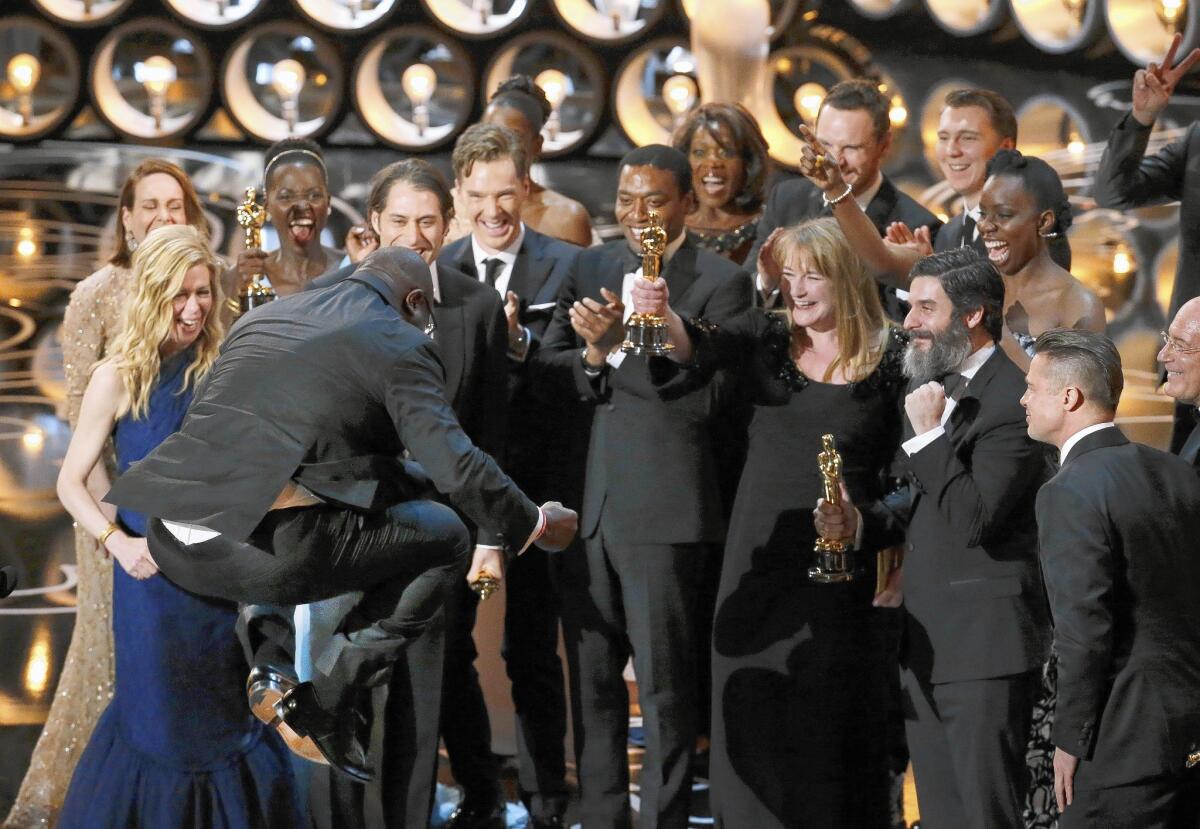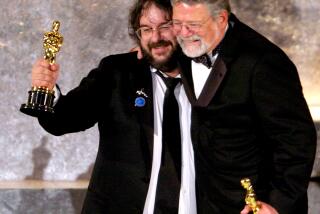Oscars 2014: It all came down to ’12 Years a Slave’ and ‘Gravity’

As the evening wore on — and did it ever wear on — the many questions everyone had going into Sunday night’s Academy Awards show boiled down to but one: Would this evening be a single coronation or a double one?
With “Gravity” cleaning up on the technical and craft side, as expected, eventually winning seven categories it was nominated for (including director for Alfonso Cuarón), there was only one thing left to decide: Would this film’s momentum sweep the board and bring home the best picture statuette as well? Or would “12 Years a Slave” keep that final honor for itself?
As everyone who followed or engaged in the endless prognostication that characterized this elongated Oscar season knew, this was the rare year when best picture was up for grabs until the very end. And as the evening progressed with few surprises, the tension surrounding how the one category without a clear favorite would play out grew.
OSCARS 2014: Full coverage | Complete list | Top nominees and winners
Finally, when “12 Years a Slave” was called, it seemed like the academy had gotten it right, given credit where credit was due by its Solomon-like decision to divide its treasure between the two films that were at the top of everyone’s lists. Though it was a terrible shame that as fine a film as “American Hustle,” which had 10 nominations, was shut out, if best picture had to go to either “12 Years” or “Gravity,” by the end of the night “12 Years” was the appropriate choice.
Even the small clips from the film interspersed throughout the program testified to its wrenching power, and the acceptance speeches for the two other awards “12 Years” won earlier were truly potent.
The poised but emotional Lupita Nyong’o, the supporting actress winner with her first major role, was clearly transported by her victory but not so much that she didn’t acknowledge the irony that “so much joy comes from so much pain,” the pain of telling such an agonizing story. “The dead are standing and watching,” she said, and at that moment it seemed true.
John Ridley, winner of the adapted screenplay award, understandably struggled to keep his emotions in check as he thanked a script supervisor from his earliest days in the business who helped with wise advice and encouragement.
PHOTOS: Show highlights | Red carpet arrivals | Quotes from the stars
An overwrought “12 Years” director Steve McQueen initially did not keep to that high standard. He instead read a long list of names who it seemed just had to be thanked. It’s not that they didn’t. But the moment of such a victory can lead to such remarkable oratory it’s a shame to waste it on a string of perfunctory acknowledgments that could easily be made another day and time.
In fact, when McQueen ended his remarks by facing the cast and crew and literally jumping up and down for sheer joy, that moment of pure and honest emotion made more of a lasting impression than all those pro-forma thanks put together.
The other acceptance moments that made a difference were also those that came from the heart. Supporting actor winner Jared Leto talked movingly about the trials of his young high school dropout mother, thanking her for “teaching me to dream,” and Darlene Love’s bursting into spontaneous song after “Twenty Feet From Stardom” won feature documentary will likely be replayed as often as Jack Palance’s one-armed pushups of years past.
While the nominal theme of Sunday’s show — Hollywood and the hero — kind of fizzled (who says the show needs a theme, anyway?), the one concept mentioned repeatedly — I counted four in the first 45 minutes alone — was that notion of dreaming and dreams.
PHOTOS: 10 years behind the scenes at the Oscars | Past performances | Awkward moments
And in truth that final division of awards between “Gravity” and “12 Years” underlined how the movie industry is a place where two kinds of dreamers find a home. There are the people who take their below-the-line jobs magnificently seriously, who live to put things on the screen that have never been seen before, and their dream came true with the seven-Oscar success of “Gravity.”
Then there are the people who dream of changing their world with their films, who want to make people think about issues that matter. Their dreams came true with the best picture award for “12 Years a Slave.”
In an ideal movie world, those dreams would meet in a single film. Maybe next year, or the one after that. In the world of movies, even critics get to dream.
More to Read
Only good movies
Get the Indie Focus newsletter, Mark Olsen's weekly guide to the world of cinema.
You may occasionally receive promotional content from the Los Angeles Times.







